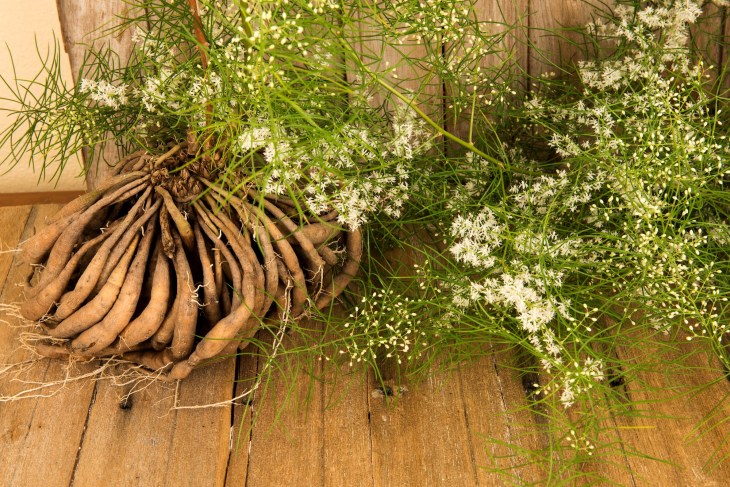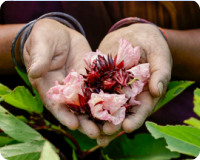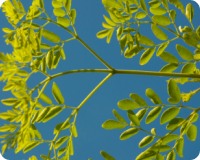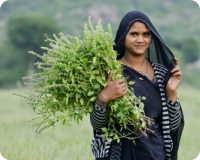

Section

Back
By Vic Shayne, Author: Consciousness: The Potentiality of All Existence: Exploring reality and belief as a subjective experience
It is rare for one plant to be so versatile, yet Shatavari has enjoyed millennia of traditional use — especially for female patients — in Ayurvedic healthcare. Shatavari (Asparagus racemosus) is one of the most powerful rejuvenating herbs in Ayurvedic medicine.
Native to India and the Himalayas, Shatavari is in the same family as common asparagus, and features small, uniform pine needles. The plant produces white flowers and blackish-purple berries. Shatavari has a well-deserved reputation among generations of healers as a plant capable of improving the health of both male and female reproductive issues.
Ayurvedic Shatavari is a climbing plant, growing in low jungle environments throughout tropical and subtropical regions of India. It is both sweet and bitter, and particularly balancing to Pitta types, but recommended for all three doshas with the ability to address internal heat.
A Crowned Herb of Ayurveda
Fifth generation Bombay Ayurvedic physician Bharat Vaidya, M.D., said, “If Ashwagandha is the king of Ayurvedic herbs, then Shatavari is the queen, alongside Tulsi. In prakarsha Grihya-sutra — the sacred Hindu texts containing information on Vedic domestic rites and rituals for householders — the herb is regarded in the context of Mula vidhi, the fundamental rule. The ancient Taittriya Aranyaka mentions the herb Shatmula, believed to be Shatavari.”
Shatavari has been roughly translated to mean “100 spouses,” referring to its effects on reproductive wellness and vitality. Part of this amazing herb’s legacy, according to Ayurvedic philosophy, is its ability to promote love and devotion.
Shatavari has been roughly translated to mean “100 spouses.” Part of this amazing herb’s legacy, according to Ayurvedic philosophy, is its ability to promote love and devotion.
Whole Body Tonic
Dr. Vaidya, director of the Ayurved Sadhana school in Colorado, explained that Shatavari is extensively used for its tonic, immunomodulatory effects, and much more. The herb is an adaptogen, which means that it plays a role in regulating the body’s systems and improving resistance to stress. And it supports the immune system by modulating the healthy function of macrophages ― cells responsible for digesting potentially destructive organisms.
In India, without question, Shatavari is the most used herbal treatment for women. Ayurvedic consultant and teacher Dr. Shashikant Patwardhan noted that Shatavari is well known as a female rejuvenative and may be useful for reproductive support, libido, PMS pain, menopausal symptoms, balancing the female hormonal system and more.
Shatavari may also be useful for stomach health and occasional diarrhea. “Dry and irritated membranes in the upper respiratory tract are soothed by this herb,” said Patwardhan, “making it possibly useful for season sensitivities and changes. It is believed to bring into balance all of the body’s fluids.”

Ayurvedic Shatavari Research
Medical News Today noted that a review of studies published in Biomedicine and Pharmacotherapy, 2018, suggests that Shatavari may support female reproductive health, with recent research suggesting that a combination of herbs, including A. racemosus, may make common menopausal symptoms more minor. A small-scale study tested the effects of herbal medicine on various menopausal issues in 117 women. After taking ayurvedic Shatavari along with three other herbs for 12 weeks, female participants reported a reduction in hot flashes and night sweats.
A study published in the Asian Pacific Journal of Tropical Disease confirmed that Shatavari can help with female hormonal wellness, including mood swings, PMS irritation and hot flashes. The same study reported that Shatavari is well deserving of its reputation as an Ayurvedic rasayana (lifespan promoter) for slowing the aging process, increasing longevity, imparting immunity, and supporting cognitive function, vigor, and vitality to the body and mind.
In addition, researchers have concluded that Shatavari may help with digestive and urinary health. These benefits come from Shatavari’s unique blend of bitter and sweet qualities and phytonutrients that feature nourishing, soothing, and cooling properties that help with many conditions when the body and mind are overheated, depleted, or out of balance. If you’re looking to balance your Vata and Pitta, Shatavari may be the place to begin.
Sustainable Cultivation
Shashi Alok, Institute of Pharmacy, Bundelkhand University, Jhansi, India, noted that due to its multiple uses, the demand for Shatavari is high. But because of trends in destructive harvesting, combined with habitat destruction and deforestation, the plant is now considered endangered in its natural habitat.
This is where Organic India makes a difference. The company’s sustainable, organic approach to farming is an exception to the modern rule, and its Ayurvedic herbs like Shatavari and others are grown according to the most careful and harmonious regenerative farming practices that support the integrity of the environment and the nutritious constituency of the plant.






